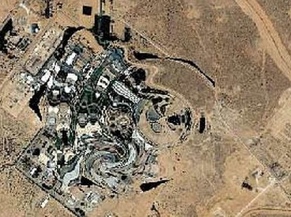|
World Jewish News

An aerial view of Israel's nuclear reactor in Dimona.
|
Israel tested Iran-bound Stuxnet worm in Dimona nuclear plant
16.01.2011, Israel and the World Israel has tested a computer worm believed to have sabotaged Iran's nuclear centrifuges and slowed its ability to develop an atomic weapon, The New York Times reported on Saturday.
In what the Times described as a joint Israeli-U.S. effort to undermine Iran's nuclear ambitions, it said the tests of the destructive Stuxnet worm had occurred over the past two years at the heavily guarded Dimona complex in the Negev desert.
The newspaper cited unidentified intelligence and military experts familiar with Dimona who said Israel had spun centrifuges virtually identical to those at Iran's Natanz facility, where Iranian scientists are struggling to enrich uranium.
"To check out the worm, you have to know the machines," an American expert on nuclear intelligence told the newspaper". The reason the worm has been effective is that the Israelis
tried it out."
Western leaders suspect Iran's nuclear program is a cover to build atomic weapons, but Tehran says it is aimed only at producing electricity.
Iran's centrifuges have been plagued by breakdowns since a rapid expansion of enrichment in 2007 and 2008, and security experts have speculated its nuclear program may have been targeted in a state-backed attack using Stuxnet.
In November, Iranian President Mahmoud Ahmadinejad said that malicious software had created "problems" in some of Iran's uranium enrichment centrifuges, although he said the problems had been resolved.
The Times said the worm was the most sophisticated cyber-weapon ever deployed and appeared to have been the biggest factor in setting back Iran's nuclear march. Its sources said it caused the centrifuges to spin wildly out of control and that a fifth of them had been wiped out.
It added it was not clear the attacks were over and that some experts believed the Stuxnet code contained the seeds for more versions and assaults.
The retiring chief of Israel's Mossad intelligence agency, Meir Dagan, said recently that Iran's nuclear program had been set back and that Tehran would not be able to build an atomic bomb until at least 2015. U.S. officials, including Secretary of State Hillary Clinton, have not disputed Dagan's view.
Neither Clinton nor Dagan mentioned Stuxnet or any other cyber-warfare possibly used against the Iranian program.
Israel has voiced alarm over a nuclear Iran and Israeli Prime Minister Benjamin Netanyahu has said only the threat of military action will prevent Iran from building a nuclear bomb.
Israel itself is widely believed to have built more than 200 atomic warheads at its Dimona reactor but it maintains an official policy of "ambiguity" over whether it is a nuclear power.
Any delays in Iran's enrichment campaign could buy more time for efforts to find a diplomatic solution to its stand-off with six world powers over the nature of its nuclear
activities.
U.S. and Israeli officials refused to comment officially on the worm, the newspaper said.
Haaretz.com
|
|
